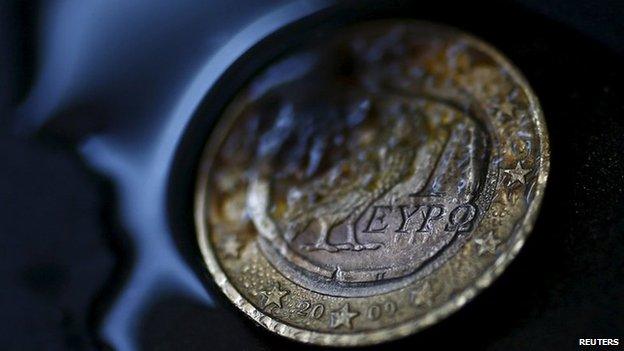Greek banks 'days away from running out of cash'
- Published
- comments

Cash within the Greek banking system will run out in just a few short days, a senior banking source has told me, amid fears that the financial crisis will force Greek companies to start laying off workers on Monday.
"This is a fully fledged banking and economic crisis," said the despairing source. "The rate of cash withdrawals has trebled in recent days, even with the limits."
Since I arrived in Athens, I have witnessed Greeks queuing at those cash machines that are working, to withdraw the maximum amount of cash they're allowed under the restrictions implemented last Monday.
"People are taking out money around the clock, out of ATMs, on the internet transferring to HSBC - you name it, they're finding ingenious ways to get their savings."
He added: "We desperately need a solution. It will not be long before our country is on its knees, with the damage so great that it will be permanent."
After the referendum polls close tonight, Greek Finance Minister Yanis Varoufakis will meet bank bosses, grouped together under the auspices of the Hellenic Bank Association, and the governor of the Bank of Greece, Yannis Stournaras, I have learned.
The meeting will take place after the result of the poll is known, to discuss whether there is any way to ease the constraints on withdrawals from banks and transfers abroad.
Bankers hope to hear what contingency measures are being discussed by the governing council of the European Central Bank, which meets tomorrow. It was a decision last Sunday by the ECB to cease providing any additional emergency lending, called ELA, that forced the banks to close last Monday.
"My concern is that if there is no easing up of the restrictions, companies will start laying off workers tomorrow," said a senior banker.
He added that the so-called capital controls, which include a ban on movement of money abroad, are leading to chronic shortages of medicines, foods, vital raw materials and other important goods.
"Companies cannot pay for imports," he said. "This is a serious problem. We are looking at a huge possible humanitarian crisis here."
What bankers are hoping to hear is that the ECB will provide enough additional lending to them to finance imports of vital goods.
Right now they fear the ECB may do the opposite, and actually demand back some of the €120bn of emergency loans it and the Bank of Greece has already provided - because the value of assets provided as security for these loans may be judged by the ECB to have deteriorated in Greece's economic and political mayhem.
"We are in this crazy position where there is no lender of last resort for Greek banks," said a banker, referring to the perceived flaw in the eurozone that the ECB is much less able to create money to help a member state like Greece than the Bank of England can do for the UK or the Federal Reserve can do in the US.
"How on earth can banks and an economy be starved of cash like this, in a civilised developed country? The banks need money to keep the economy functioning, and we're almost out."
The banker said that if the ECB refuses to provide any additional credit, then the Athens government will have to think about abandoning the euro and introducing a new drachma currency - because otherwise, it would be impossible to pay wages and the economy would deteriorate from being frozen, as at present, to catastrophe.
"How can the eurozone and Athens be arguing over which taxes to increase here?" he asked. "If the economy is destroyed, taxes won't solve anything. What we need is a plan to save the banks."
As of this moment, banks are expecting that they will continue tomorrow to provide cash, up to €60 per account, via ATMs, and some branches may open to pay pensions.
But they wait to learn what restrictions they will face thereafter.